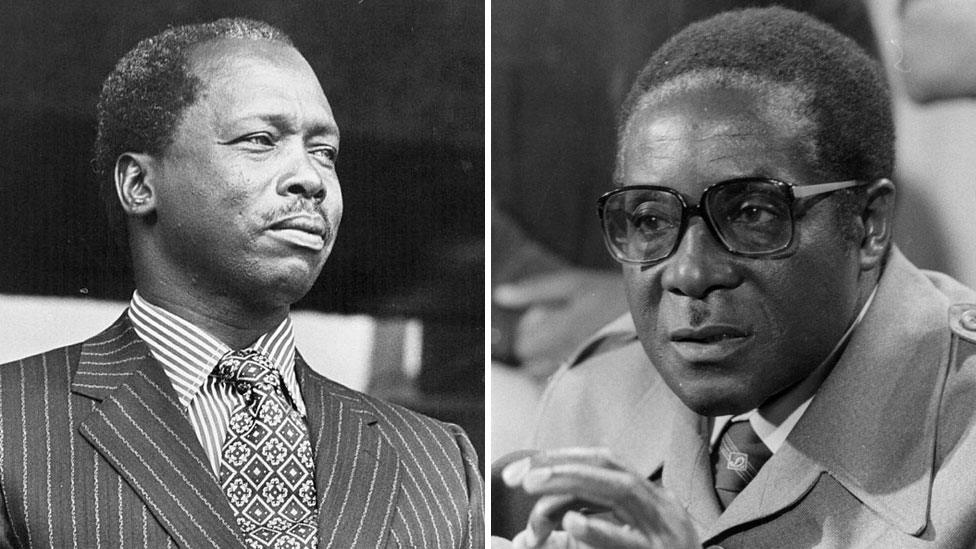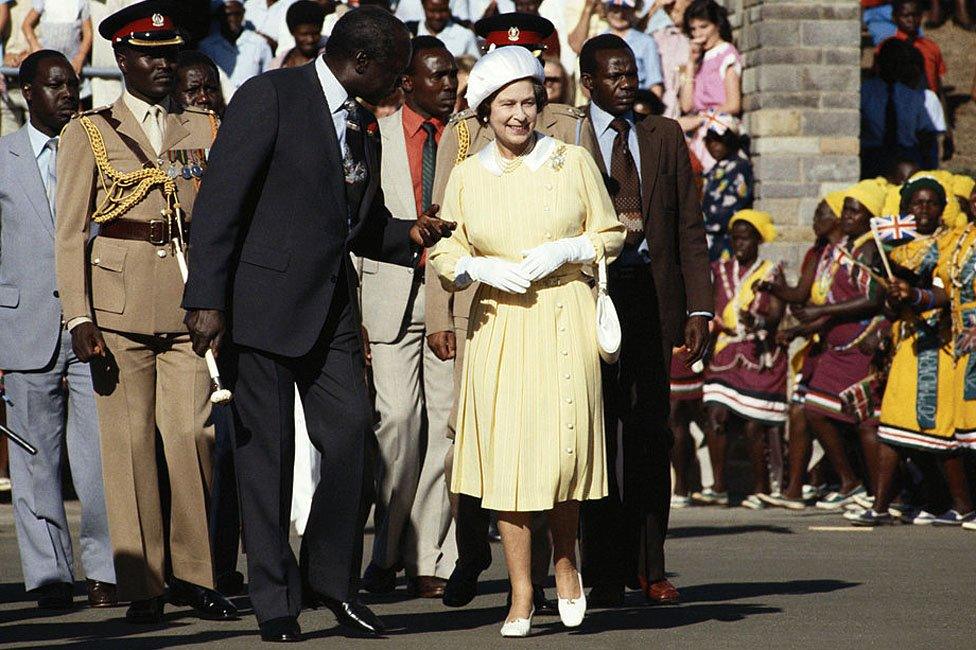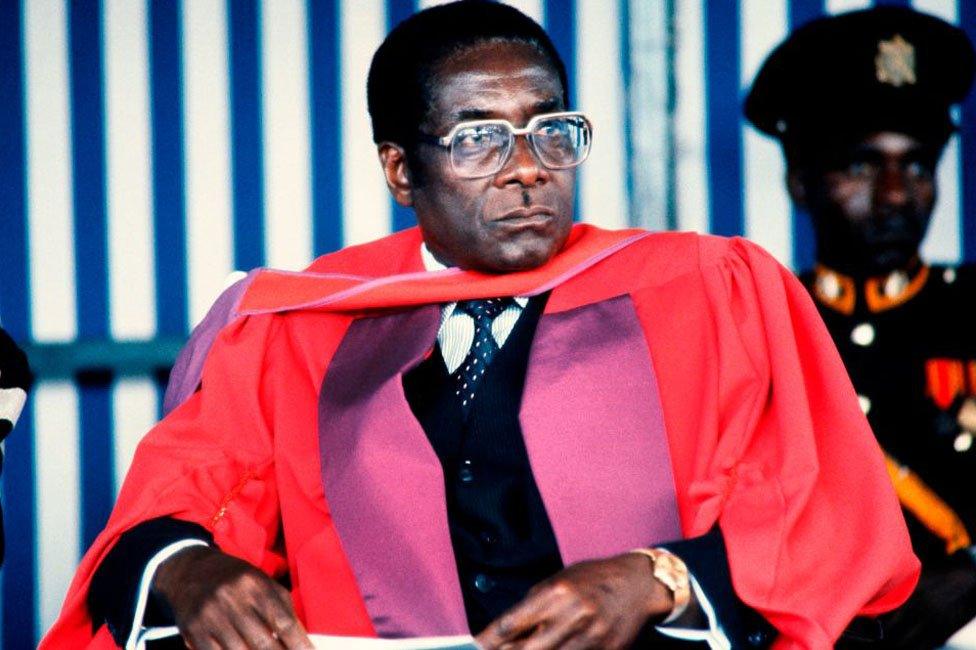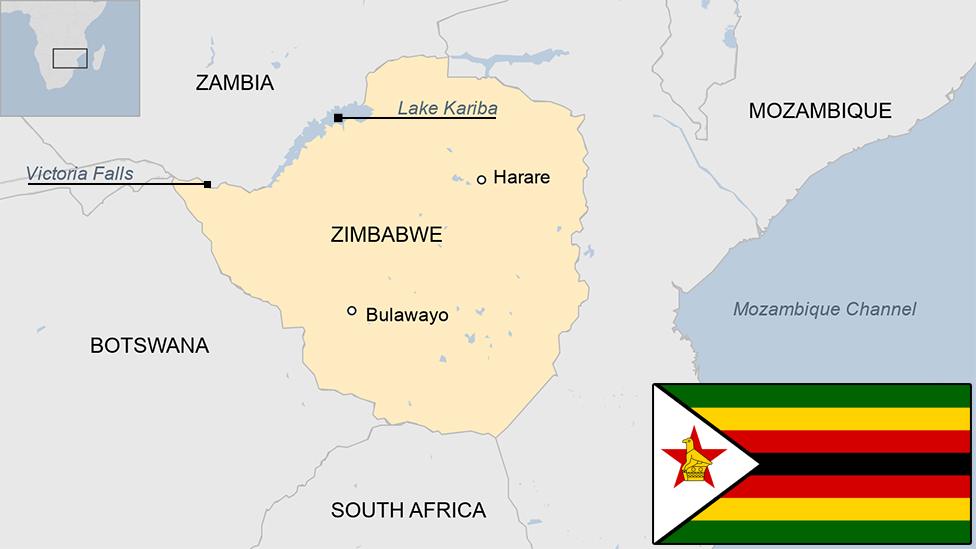Mugabe and Moi: The legacy of a dying African generation
- Published

In our series of letters from African writers, Zimbabwean journalist-turned-barrister Brian Hungwe compares the life of his late President, Robert Mugabe, with Kenya's former leader, Daniel arap Moi, who was buried last week.
Both Robert Mugabe and Daniel arap Moi were born in 1924 and both died at the age of 95.
They were both involved in anti-colonial politics, though unlike Mugabe, Moi never took up arms.
And they both governed former British colonies, with white settler populations, for more than two decades.

President Daniel arap Moi welcomed Queen Elizabeth II to Kenya in 1983

Queen Elizabeth II appeared to like both men and visited their countries during the era of stability, before tales of corruption and ruthlessness towards opponents made them less desirable destinations for a royal trip.
And Moi and Mugabe were both shaped by rural upbringings, where they herded cattle and goats.
Christian influence
Neither man grew up with their fathers and consequently had that paternal gap filled by missionaries
Moi sought spiritual refuge at a Protestant missionary primary school, where he took the Christian name of Daniel.
Mugabe was embraced by white Catholic missionaries at Kutama, particularly Father Jerome O'Hea, who became his mentor.
And then both Moi and Mugabe went into education, becoming successful teachers.

Robert Mugabe seen here receiving an honorary doctorate in 1984, worked as a school teacher

Their passion for education was felt in their policies.
Moi promoted education through a school milk programme, and Mugabe introduced free education that increased literacy levels.
But they also both showed a thirst for control, and sought to introduce one-party systems. Moi was successful in banning other parties, but it never came to pass in Zimbabwe.
However, their obsession with control became their undoing.
Political clampdown
Moi, especially after the failed coup of 1982, targeted opposition voices.
He was responsible for the jailing and torture of hundreds of people, as he tried to maintain total control.
Mugabe, likewise, clamped down on the opposition, with people being locked up on spurious charges and opponents being harassed at every turn.
And like Moi, Mugabe was linked to the deaths of some leading politicians.
Mugabe, perhaps went further than Moi in violently exploiting ethnicity.
Mugabe stubbornly held on to power, finally being forced out by the military. He died a 'sad, sad man' in the words of a family member"

Shortly after Zimbabwean independence, he masterminded a brutal military campaign, known as Gukurahundi, that saw thousands of Ndebele-speaking people killed and buried in mine shafts.
But, as with the excesses in Kenya, the western capitals appeared to turn a blind eye in the 1980s.
They also initially ignored signs of corruption, and that decade was marked in both countries as a time of economic stability.
Mugabe: From war hero to resignation
And then came the period when the two men's legacies truly diverge.
The difference was over the thorny question of land reform.
In Kenya, despite a clamour for a more equitable distribution of land, Moi, and his predecessor Jomo Kenyatta, never really took action. Perhaps because the ruling elite had already benefited from acquiring large amounts of land from the departing colonial government.
Mugabe, instead, played a populist card and embarked on land seizures that resulted in hundreds of deaths, involving both farmers and opposition supporters.

More on Moi and Mugabe:

The land seizures caused food shortages and a gradual economic decline. And donors turned their back on the country.
Mugabe stubbornly held on to power, finally being forced out by the military. He died a "sad, sad man" in the words of a family members at his funeral.
Moi, who had survived a coup attempt, finally accepted that he had to leave power, after not being allowed to run for office again. He died at peace having acknowledged some of the harm that he had caused.
Watch some of Daniel arap Moi's key moments
Nevertheless, his death was met with a mixed reaction in Kenya as people recognised his flaws as a leader.
Both men, in their deaths, were honoured by the state and dignitaries came to praise them. Both were buried at their rural homes.
They appear to represent a different era and their passing provides a lesson for future leaders: never stay in power for too long, deliver the best for your people, and importantly remember that "the evil that men do lives after them; the good is oft interred with their bones".

More Letters from Africa
Follow us on Twitter @BBCAfrica, external, on Facebook at BBC Africa, external or on Instagram at bbcafrica, external

- Published30 August 2023
